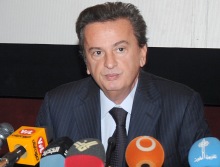 The cabinet convened at Baabda Presidential Palace for the first time after securing the parliament’s vote of confidence, National News Agency reported on Thursday.
The cabinet convened at Baabda Presidential Palace for the first time after securing the parliament’s vote of confidence, National News Agency reported on Thursday.
The session was chaired by President Michel Suleiman, the report also said, adding that there are 73 items on the cabinet’s agenda.
Suleiman and Prime Minister Najib Mikati met before the session convened, the report added.
The cabinet renewed the mandate of Central Bank Governor Riad Salameh and appointed Maj. Gen. Walid Salman as the new Army Chief of Staff replacing Maj. Gen. Shawqi al-Masri who has retired
Dr. Antoine Shoqair was also appointed as the director general of the Presidency of the Republic.
The cabinet reportedly postponed the appointment of a new chief for the General Directorate of General Security.
“The appointment of army intelligence chief Abbas Ibrahim as the new head of General Security has not been included in the cabinet’s agenda Thursday,” reported Al-Hayat earlier on Thursday.
The necessary conditions to discuss the appointment have not been provided amid reports that Maronite Patriarch Beshara al-Rai is keen on restoring this position to the Maronite sect.
According to Nahar up until 1998, the position of General Security chief had long been assumed by a Christian figure, but former President Emile Lahoud, appointed a Shiite to the position .
Ministerial sources told the al Hayat that Free Patriotic Movement leader MP Michel Aoun has also echoed the position of the Patriarch but avoided bringing up this issue in order to avert a dispute with Hezboullah and AMAL Movement, which both support the appointment of Ibrahim, a Shiite, to the post.
Al-Hayat reported that Aoun settled the matter by proposing the appointment of a Christian as deputy General Security chief.
Lebanese Forces bloc MP George Adwan said on Thursday that the General Security chief must be “agreed upon by all parties” and close to President Michel Suleiman.
Adwan also told MTV that the General Security chief is responsible for the borders and for controlling who enters and who leaves the country, adding that the latter is also responsible for the foreigners present in Lebanon.

Leave a Reply
You must be logged in to post a comment.